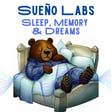
Lucid Dreaming and Cultivating Self-Intimacy with Mr Verdickt
What's the easiest way to lucid dream? This is the wrong question, according to hypnotherapist Mr Verdickt. As our culture pushes to make everything a mechanized, step-by-step process, it's harder to connect with our authentic emotions and aspirations. More than just flying or having superpowers, lucid dreaming is a pathway to self-awareness and self-intimacy, and the practice can be an integral part of your personal journey of growth and healing.
Mr Verdickt is a hypnotherapist specialized in lucid dreaming and ancestral African healing. He writes about personal development and well-being, particularly in a performance-driven work culture.
Connect with Mr Verdickt at https://theverdickttherapy.substack.com/.
In this episode:
- Misconceptions and realities about hypnotherapy
- The goals and practice of hypnotherapy
- Understanding truth in our subconscious minds
- An alternative to medication-driven mental health care
- Developing an awareness of your inner self
- Archetypal dreams and recognizing a lucid dream
- Rejecting the notion that everything should be a quick, step-by-step process
- Unlocking self-intimacy
Connect with us at SuenoLabs.com. We're currently looking for contributors and podcast guests!




